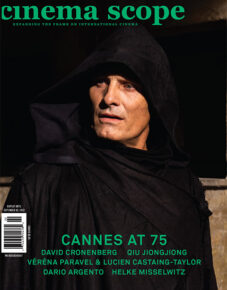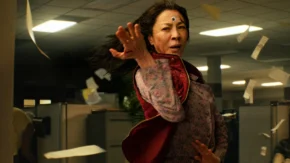CS91
The Plains (David Easteal, Australia)
By Chloe Lizotte | 02/20/2023 | Cinema Scope Online, CS91
By Chloe Lizotte In his first feature, The Plains, David Easteal nestles his camera into the backseat of a Hyundai sedan belonging to Andrew (Andrew Rakowski), a lawyer in his late fifties. As he commutes home from a sleepy office park on the outskirts of Melbourne, he whizzes by suburban strip malls and inches through traffic jams, then merges onto the freeway alongside…
Read More → Cinema Scope Issue 91 | Table of Contents
By Cinema Scope | 06/21/2022 | CS91, From Cinema Scope Magazine, Table of Contents
Interviews Wippet Good: A Conversation Between Don McKellar and David Cronenberg on Crimes of the Future by Lawrence Garcia, Don McKellar Send in the Clowns: Qiu Jiongjiong on A New Old Play by Shelly Kraicer Gross Anatomy: Véréna Paravel & Lucien Castaing-Taylor on De Humani Corporis Fabrica by Blake Williams Features Endless Night: Dark Glasses…
Read More → Wippet Good: A Conversation Between Don McKellar and David Cronenberg on “Crimes of the Future”
By Lawrence Garcia | 06/21/2022 | CS91, From Cinema Scope Magazine, Interviews
David Cronenberg’s Crimes of the Future may be marked as a “return” for the 79-year-old director in a number of respects. His first feature in eight years, it is also his first to be based on an original script since eXistenZ. In addition, Crimes sees Cronenberg revisiting, after a fashion, his 1970 film of the same name, from which he’s taken the central premise of genetic mutations in humans which have resulted in the spontaneous growth of new organs.
Read More → Send in the Clowns: Qiu Jiongjiong on “A New Old Play”
By Shelly Kraicer | 06/21/2022 | CS91, From Cinema Scope Magazine, Interviews
The brightest light in the Chinese independent cinema world at this moment is Beijing-based filmmaker and artist Qiu Jiongjiong. In an atmosphere in China of increasing surveillance and control of non-official, unauthorized artistic activity in China, Qiu, now 44, stands out as an artist with a powerful, complex, engaging vision who has found a way to continue to work without compromise. His new film, A New Old Play, premiered at the 2021 Locarno Film Festival and is now having a series of screenings in North America, after following its pickup by Icarus Films via their dGenerate Films Collection
Read More → Gross Anatomy: Véréna Paravel & Lucien Castaing-Taylor on “De Humani Corporis Fabrica”
By Blake Williams | 06/21/2022 | CS91, From Cinema Scope Magazine, Interviews
...watching this movie frequently hurts like hell, and not just physically. With a camera that furiously navigates its subjects’ myriad intestinal tracts, cranial cavities, and other, mercifully unidentifiable visceral miscellany, De Humani Corporis Fabrica is very probably the most aesthetically interoceptive movie ever made for theatrical exhibition.
Read More → Endless Night: “Dark Glasses” and the Remnants of Dario Argento’s Mad Poetry of Terror
By Christoph Huber | 06/21/2022 | CS91, Features, From Cinema Scope Magazine
Everybody is staring into the sky, wearing special glasses or holding up black strips to protect their eyes. She stops at a park, joining a small group of people, putting on her sunglasses. Dogs bark as the light dims—they are awaiting a solar eclipse. “Not just dogs, every animal is afraid,” a man explains to his kid. “Even our ancestors, a long time ago, feared the eclipse.” His wife adds, “They thought the disappearance of the sun meant the end of the world.”
Read More → The Natives Are Restless: Cannes’ Diamond Jubilee and Albert Serra’s “Pacifiction”
By Mark Peranson | 06/21/2022 | CS91, Festivals, From Cinema Scope Magazine, Spotlight
By Mark Peranson The 75th anniversary celebration of Cannes was very much a “celebration of cinema,” a my-God-it’s-full-of-stars-studded affair intended as a show of power that, rightly, would make any other such movie-based event jealous. As witnessed by its anniversary trailer, which added (seemingly via Photoshop) the names of Cannes-branded auteurs like Federico Fellini, Xavier…
Read More → Stars at Noon (Claire Denis, France)
By Giovanni Marchini Camia | 06/21/2022 | CS91, Festivals, From Cinema Scope Magazine, Spotlight
After waiting 34 years to return to the Cannes Competition, Claire Denis deserved a warm welcome back. Instead, she got to be the chosen victim of the Brown Bunny Syndrome, the annually recurring compulsion among festival attendees to proclaim a film as the worst ever to compete for the Palme d’Or. Although she received some vindication from the jury, who awarded her the Grand Prix (ex aequo, but still…), the critical vitriol is baffling.
Read More → EO (Jerzy Skolimowski, Poland/Italy)
By Jordan Cronk | 06/21/2022 | CS91, Festivals, From Cinema Scope Magazine, Spotlight
When Jerzy Skolimowski cancelled his press commitments at Cannes to promote his new feature, EO, he denied critics and cinephiles an explanation behind the festival’s most mystifying entry. All but engineered to prompt bemusement, the film, a bold, modern-day reimagining of Bresson’s Au hasard Balthazar (1966),is one whose mysteries are in fact part and parcel of its allure.
Read More → CS91 Editor’s Note
By Mark Peranson | 06/21/2022 | Columns, CS91, From Cinema Scope Magazine
It’s that time again. Over the last two decades in these pages I’ve spent way too much time (at great personal anguish) trying to come to grips with the experience of the Festival de Cannes even if by this point in the history of film journalism, a few weeks after the fact everything anyone could say about Cannes has already been said. But I know that many readers take vicarious pleasure from reading my report, so as long as we keep going, or until Cannes hires me, I guess I’m stuck doing it.
Read More → Canadiana | A Cinema of Care: The Films of Janis Cole and Holly Dale
By Cayley James | 06/21/2022 | Canadiana, Columns, CS91, From Cinema Scope Magazine
When people discuss the documentary work of Janis Cole and Holly Dale, a number of adjectives will inevitably appear: “caring,” “generous,” and “empathetic,” among them. The filmmakers’ commitment and intention of sharing space with their subjects resulted in what the critic Jon Davies once described as “profoundly ethical and anti-moralistic” filmmaking.
Read More → Deaths of Cinema | In Transit: Jim Jennings (1951-2022)
By Michael Sicinski | 06/21/2022 | Columns, CS91, Deaths of Cinema, From Cinema Scope Magazine
Ordinarily when one is tasked to compose an obituary for a public figure, the writer can assume that the reader has some basic familiarity with the subject. This lends itself to a particular approach, which usually entails an expression of the subject’s significance to his or her field, some historical context for their achievements, and an overall reminder of the enduring value of their work. In the case of experimental filmmaker Jim Jennings, who died on May 19th, some of these assumptions are frustratingly inapplicable.
Read More → Global Discoveries on DVD: Lessons in Oppression
By Jonathan Rosenbaum | 06/21/2022 | Columns, CS91, DVD Reviews, From Cinema Scope Magazine
Apart from those few who managed to escape from totalitarian regimes and occupied countries, most North Americans know as little about living under a dictatorship and/or in an occupied territory and what that entails as I do.
Read More → Hit the Road (Panah Panahi, Iran)
By Adam Nayman | 06/21/2022 | CS91, Currency, From Cinema Scope Magazine
Many years ago, I sat down for a festival screening of an Iranian film next to another local Toronto critic whose pugnacious reputation preceded him. Unsolicited and not-so-rhetorically, he asked me if the long scenes of rural driving native to so many of that country’s arthouse exports were—and here I am quoting from memory—somehow equivalent to the action scenes in Hollywood releases. It wasn’t a serious question, of course, just a bit of sarcastic saber-rattling before the lights went down.
Read More → Everything Everywhere All at Once (Daniel Kwan and Daniel Scheinert, US)
By Angelo Muredda | 06/21/2022 | CS91, Currency, From Cinema Scope Magazine
Eager to celebrate a theatrical box-office win, Variety recently praised the success of Daniel Kwan and Daniel Scheinert’s equally moving and galling Everything Everywhere All at Once, chirping that its broad appeal beyond arthouse crowds attests not only to adult audiences’ willingness to return to theatres for the right sort of movie, but also to the fact that “ticket buyers really love the concept of a multiverse.”
Read More → 















